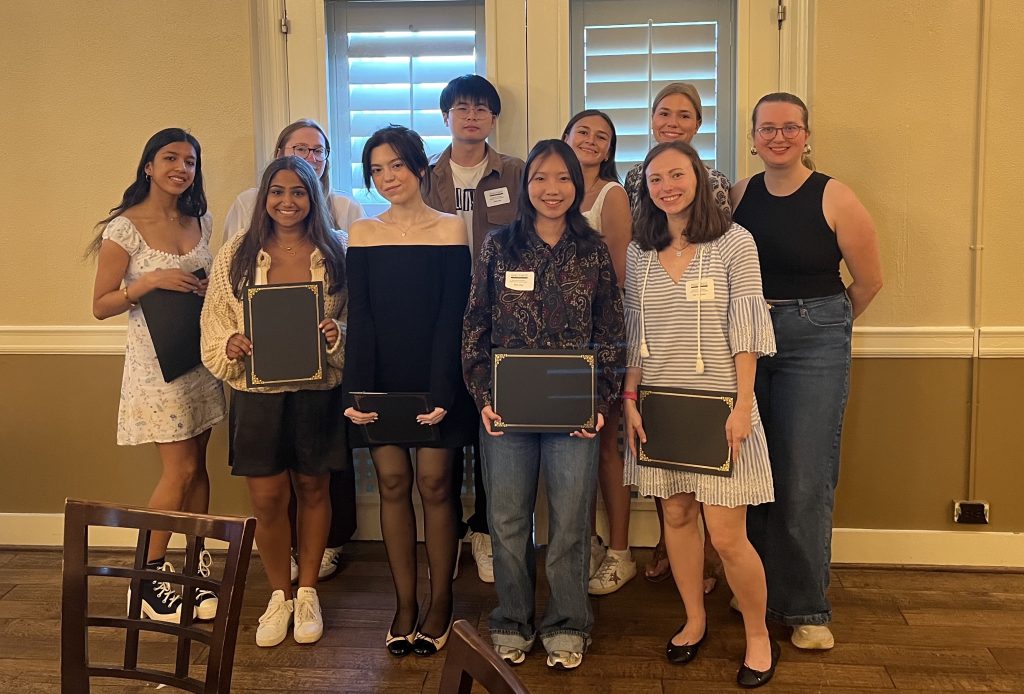2025 History Department Awards and Prize Winners

Congratulations to our 2025 History Department Paper Prize and Award Winners!
The David W. Hadley Prize for Historical Writing for the 100 Level and First Year Students is awarded to Sophia Fafatas for her paper, “The Congo Free State: Examining King Leopold’s Reign of Terror in the Pursuit of Rubber.”
This paper represents a strong grasp of historical scholarship: it is source-driven, analytical, and ethically engaged. It reflects a maturing understanding of how historians construct narratives, critique sources, and wrestle with the complexity of past injustices. Sophia Fafatas grounds her analysis in a specific historical context—the late 19th-century wave of European imperialism—and centers King Leopold II’s actions within that broader trend. She successfully exhibits an ability to examine critically the motivations behind European imperialism and exposes the hypocrisy of the so-called civilizing mission
The Stephen Vella Prize for Excellence in Writing is awarded to Molly Steur for her paper, “Understanding Coloradan Anti-Suffragist Women’s Place in History: A Paradox in the Polls.”
In a very competitive pool of submissions, Molly Steur’s writing stands out for its excellent analysis of what drove women activists in Colorado to the state polls to vote against a 1893 Referendum to grant Colorado women their equal rights to vote. In addition to providing a skillful intervention in the existing scholarly literature and subtle analysis of primary sources, Steur’s work effectively conveys complex ideas to a wide audience, which is a hallmark of excellent writing
The Richard Worden Griffin Research Prize in Asian, African, or Latin American History is awarded to Jiale Zhu for her paper, “The Myth of Coolie: Chinese Coolie Testimonies and Acts of Resistance in Nineteenth-Century Cuban Plantations.”
Drawing on materials written in English, Chinese, and Spanish, Zhu makes an original contribution to labor and colonial history in this analysis of the experiences of Chinese laborers in 19th century Cuba. By analyzing over 1,000 testimonies of Chinese “coolie” workers contained in an 1874 report by Qing official Chen Lanbin, Zhu makes two important claims. First, the Chinese coolie trade should be seen as a continuation of the Atlantic slave trade, given its reliance on deceptive recruitment, brutal transport conditions, and plantation exploitation. Second, traditional portrayals of coolies as passive victims have erred by ignoring the ways that coolies asserted dignity and autonomy despite systematic dehumanization. Particularly innovative is the reinterpretation of suicide through a Confucian cultural lens, transforming what historians have often dismissed as desperation into profound acts of agency and dignity.
The Chilton Pearson Research Prize in United States History is awarded to MacKenzie Lael for her paper, “Dressed for Dissent: Exploring Attire as a Vehicle for Resistance in the Women’s Suffrage Movement.”
Lael’s paper showed deep research into the history of feminist fashion and politics during the movement for women’s suffrage in the early 20th century. The committee was impressed with her ability to not only talk about this history and bring out really excellent case studies, but how the feminist politics of fashion continued into the present day.
The W. J. Cash Award for Studies in Southern History is awarded to Ally Werstler for her paper, “Taiwanese Student Protestors at North Carolina State University: Solidarity Building and Progressive Activism in the Conservative South, 1971–1987”
Drawing on oral histories, student publications, and media reports, Werstler offers a compelling analysis of how the Taiwanese Association of America’s North Carolina chapter built alliances with the Civil Rights Movement, the Student Nonviolent Coordinating Committee, and anti–Vietnam War activists, adopting community-building tactics to advocate for a free Taiwan. Her work powerfully illustrates how these students adapted global and domestic protest strategies to challenge authoritarianism, state surveillance, and limitations on free speech within the deeply conservative political climate of the US South.
The Forrest W. Clonts Award for Excellence in History is awarded to Jiale Zhu. This award is given to an outstanding history student each year; faculty consider academic achievement, intellectual engagement, and service to the department.
Jiale Zhu’s intellectual journey at Wake Forest demonstrated a profound love of history and a courageous dedication to pursuing historical truth as the “whole truth.” A first-generation college student from an impoverished village in rural China, she witnessed firsthand the harsh realities of social injustices. As a history major, she sought a deeper understanding of the past from multiple contexts and perspectives, with the goal of crafting inclusive historical narratives that challenge entrenched misinterpretations and prejudices. Based on a diligent analysis of archival sources in Chinese, Spanish, and English, Jiale’s honors thesis embodies her commitment to the discipline of History. She has challenged dominant narratives that portray Chinese coolies as passive victims. Through her meticulous research, she has highlighted their agency expressed through acts of resistance ranging from suicide and escape to violent rebellion. We congratulate Jiale for her rigorous and deeply engaged work as a student of History and for her research that exemplifies the pro humanitate ideal in historical scholarship.
The Nathan R. and Margaret P. Shotwell Scholarship in History is awarded to Sydney Falk. The Nathan R. and Margaret P. Shotwell Scholarship in History is awarded to a rising senior history major who has a strong grade point average, has demonstrated excellent academic performance and made significant contributions to the Department of History.
Students Priya Mendiratta, Kelsi Patel, Jack Zhu, and Jiale Zhu were awarded Howell Smith Fellowship Funds during the 2024-25 academic year. This fund enhances undergraduate learning experiences and career development by enabling their attendance in professional History conferences or similar scholarly or academic meetings. Students acquire and exchange information, knowledge, and advice from and with history professionals about the academic discipline of history as a profession. Four awardees this year traveled to attend the annual meetings of the Association for Historical Studies and of the North Carolina Association of Historians.
